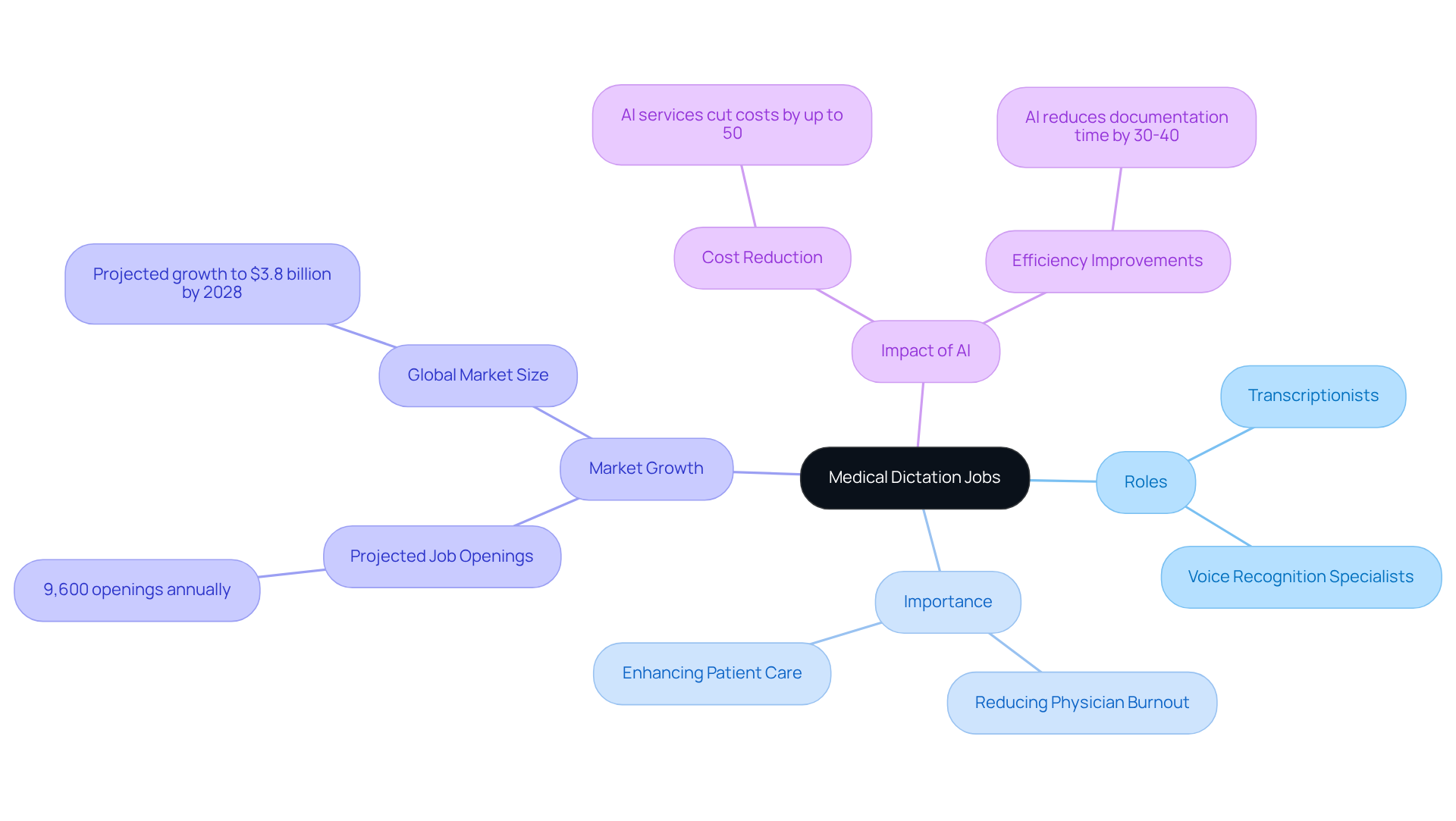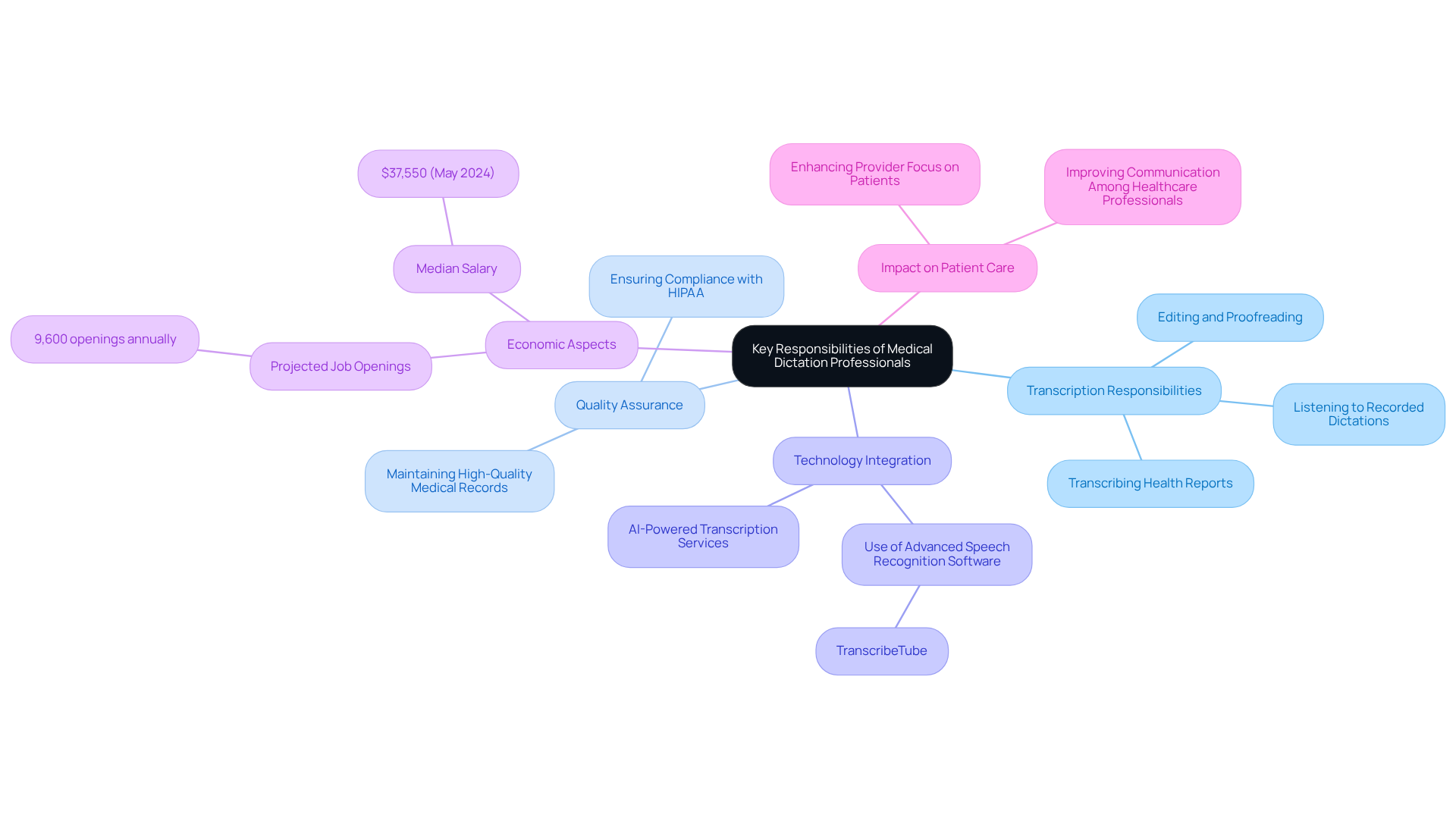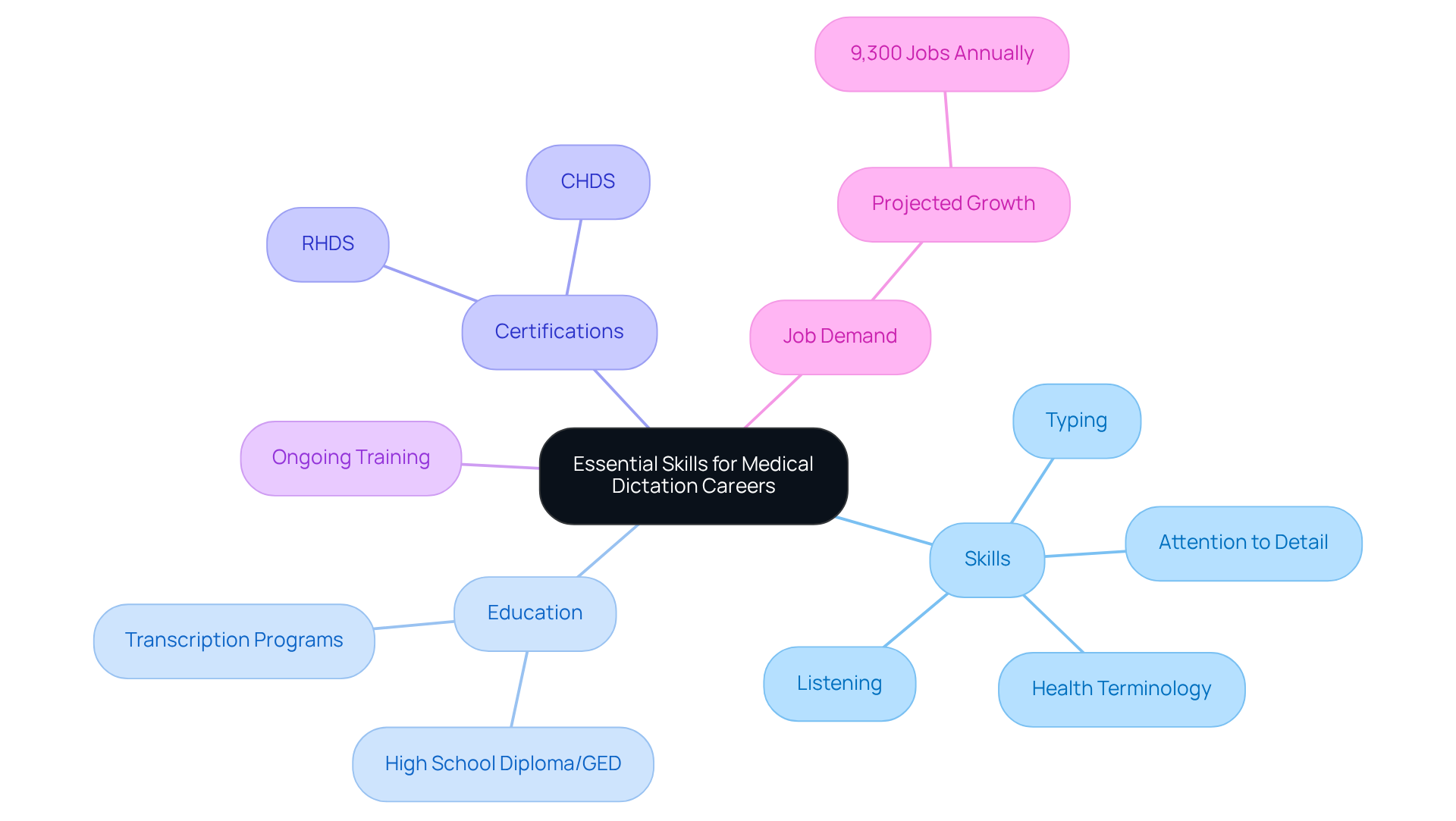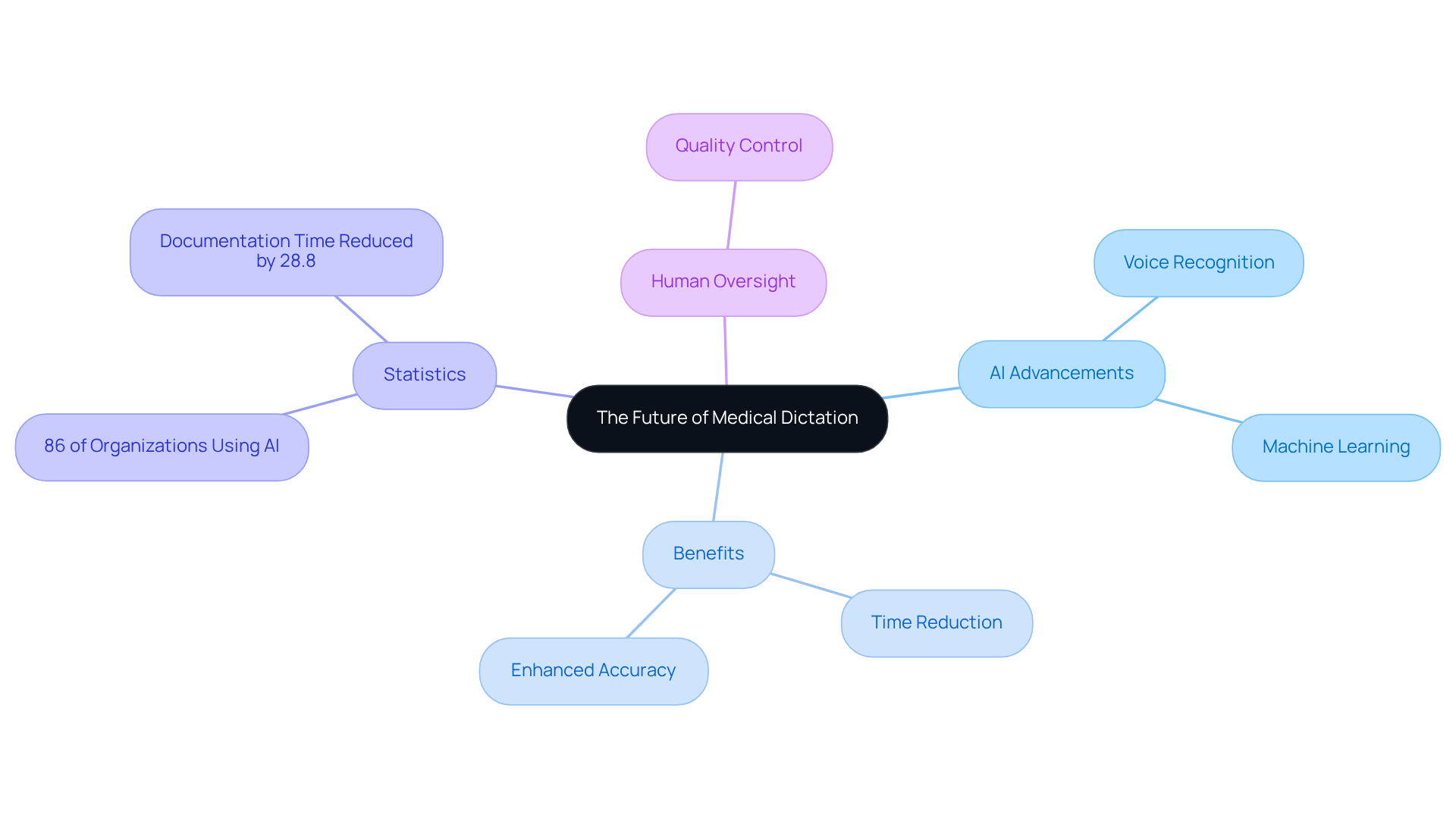Overview
In the demanding world of healthcare, medical dictation jobs play a vital role in ensuring that spoken medical information is accurately transcribed into written records. This process not only supports effective patient care but also alleviates the administrative burdens that healthcare providers often face. Have you ever considered how much easier it would be to focus on patients if the documentation process were streamlined?
The growing demand for these roles is a testament to their importance, especially as AI technologies become integrated into the healthcare landscape. These advancements enhance efficiency and accuracy, yet they also highlight the essential need for human oversight to ensure that documentation remains of the highest quality. How can we ensure that technology works hand-in-hand with compassionate care?
By embracing the value of medical dictation jobs, we can foster an environment where healthcare providers can dedicate more time to what truly matters—caring for their patients. Let’s work together to support these roles, recognizing their impact on both patient outcomes and the well-being of healthcare professionals. Your engagement in this conversation is crucial. How can you contribute to this vital aspect of healthcare?
Introduction
As healthcare continues to evolve, we recognize the profound emotional challenges faced by providers in delivering quality care. The importance of accurate and efficient medical documentation has never been more critical. Medical dictation jobs, including transcriptionists and voice recognition specialists, form the backbone of this process. They enable healthcare providers to focus on what truly matters: patient care, rather than being weighed down by administrative burdens.
However, as technology advances and our reliance on artificial intelligence grows, we must reflect on a pressing question: how will these changes impact the future of medical dictation roles? More importantly, how will they affect the quality of patient care? It’s essential to consider these implications as we navigate this evolving landscape together.
Defining Medical Dictation Jobs: Roles and Importance
Medical dictation jobs involve the transcription of spoken medical details into written records, primarily for individuals' information. These roles are essential in ensuring accurate and timely records of client interactions, which are crucial for effective medical service delivery. Have you ever considered how overwhelming administrative tasks can be for healthcare providers? Medical dictation jobs, including those of transcriptionists and voice recognition specialists, play a vital role in alleviating this burden, allowing providers to focus more on what truly matters: patient care.
As the reliance on electronic health records (EHRs) grows, so does the importance of these roles. Healthcare providers increasingly depend on transcriptionists to reduce record-keeping pressures and prevent physician burnout caused by excessive administrative duties. This trend highlights the need for support in the healthcare field. The healthcare transcription market is projected to expand significantly, with an anticipated 9,600 medical dictation jobs opening each year over the next decade.
Moreover, AI-driven transcription tools are transforming the landscape, offering services that can cut costs by up to 50% compared to traditional methods. This evolution not only enhances efficiency but also improves the reliability of health records. Think about the impact: transcriptionists connect voice recordings to fully compliant patient records, ensuring that healthcare professionals can deliver high-quality care.
In summary, the role of medical dictation professionals is more significant than ever. They are crucial in bridging the gap between spoken information and written records, enabling healthcare providers to focus on their patients. If you are in the healthcare field, consider how these services can support you and your practice. Together, we can ensure that patient care remains at the forefront of our efforts.

Key Responsibilities of Medical Dictation Professionals
Medical dictation jobs are essential in the healthcare landscape, as they address the emotional and administrative challenges faced by providers. They listen to recorded dictations from healthcare professionals, transcribing these recordings into precise health reports. This ensures that documentation not only meets legal and ethical standards, including HIPAA, but also alleviates some of the burdens that can detract from patient care.
Their responsibilities extend to editing and proofreading documents for clarity and precision, which is essential for maintaining high-quality medical records. By leveraging advanced speech recognition software, such as TranscribeTube, they enhance the efficiency of the transcription process. This allows healthcare providers to focus more on what truly matters: the patients.
By effectively managing these tasks, dictation specialists contribute significantly to the maintenance of comprehensive health records. This detailed documentation is crucial for ongoing care and plays a vital role in treatment planning. Precise medical records enable smooth communication among medical professionals, decreasing the risk of mistakes and enhancing overall client outcomes.
Furthermore, the integration of generative AI in the dictation process can streamline transcription, enhance accuracy, and reduce turnaround times. This innovation allows professionals to dedicate more time to patient care, ultimately improving the quality of service provided.
As the healthcare landscape continues to evolve, the importance of skilled transcriptionists in ensuring precise and reliable documentation grows. The economic significance of this profession is highlighted by the median yearly salary for transcriptionists, which was $37,550 in May 2024. Despite a projected decline of 5 percent in employment from 2023 to 2033, approximately 9,600 medical dictation jobs are expected to open each year. These openings arise primarily due to workforce turnover rather than new job creation, underscoring the ongoing need for skilled professionals who can leverage AI tools to enhance efficiency and improve patient care outcomes.
In light of these challenges, it is essential to recognize the invaluable contributions of dictation specialists. By supporting their work, we can ensure that healthcare providers are equipped to deliver the best possible care to their patients.

Essential Skills and Qualifications for Medical Dictation Careers
In the demanding world of healthcare, professionals often face emotional challenges that can affect their ability to provide the best care. To thrive in medical dictation jobs, it is essential to have strong listening and typing abilities, along with a keen attention to detail and a solid grasp of health-related terminology. Familiarity with medical documentation standards and proficiency in transcription software are vital skills that can alleviate some of these burdens.
Many employers prefer candidates with formal education in transcription or related fields, as well as certification from recognized organizations like the Association for Healthcare Documentation Integrity (AHDI). For newcomers, the Registered Healthcare Documentation Specialist (RHDS) certification is an excellent starting point, requiring the successful completion of an exam. For those with more experience, the Certified Healthcare Documentation Specialist (CHDS) certification is available, also necessitating an exam.
Ongoing education and training are crucial in this rapidly evolving field. With constant advancements in technology and changes in regulations, it's important for professionals to stay competent and effective in their roles. Aspiring transcriptionists should also note that a high school diploma or GED is typically required to enter the field.
Training programs, often available at community colleges or online, cover essential topics such as healthcare terminology, transcription methods, and documentation practices. These programs equip aspiring transcriptionists with the necessary skills to succeed in medical dictation jobs, which are essential in this vital area of healthcare.
The demand for medical dictation jobs, specifically for healthcare transcriptionists, is expected to grow, with a projected increase of 9,300 positions each year from 2021 to 2031. This highlights the significance of pursuing a fulfilling career in this field, where your contributions can make a meaningful difference in patient care.

The Future of Medical Dictation: Trends and Technological Impact
The terrain of medical dictation jobs is changing rapidly, and this evolution is largely driven by advancements in artificial intelligence (AI) and voice recognition technologies. These innovations are not just streamlining the transcription process; they are also significantly reducing the time needed for documentation while enhancing accuracy. Have you ever felt overwhelmed by the administrative tasks that take time away from patient care? AI-powered dictation tools can adapt to individual speech patterns and medical terminology through machine learning, improving their effectiveness over time.
As these technologies progress, they promise to lighten the administrative load on medical providers, thus creating more medical dictation jobs and allowing you to focus more on caring for individuals. However, it’s essential to remember that the human aspect remains crucial. Oversight and quality control in record-keeping are vital to ensure that patient files are accurate and thorough. Statistics indicate that 86% of medical organizations are currently utilizing AI, reflecting a growing trend towards integrating these tools into everyday practice.
Furthermore, studies show that AI-driven solutions can reduce documentation time by up to 28.8%. This underscores their potential to enhance efficiency in healthcare settings. While the future of medical dictation jobs appears promising, it’s crucial to maintain a balance between technological innovation and the necessary human oversight to safeguard patient care. Let's embrace these advancements together, ensuring that we prioritize both efficiency and compassion in our practice.

Conclusion
Medical dictation jobs play a vital role in our healthcare system, transforming spoken medical information into precise written records. These positions not only ease the administrative burdens that healthcare providers face but also keep patient care at the forefront of their efforts. As the healthcare landscape evolves, the importance of medical transcriptionists and voice recognition specialists is increasingly recognized, highlighting their essential contributions to maintaining high-quality patient records.
Have you ever considered the emotional toll that administrative tasks can take on healthcare providers? Medical dictation professionals significantly enhance healthcare efficiency by facilitating accurate documentation, which is crucial for effective treatment planning and seamless communication among medical teams. The integration of AI technologies further streamlines these processes, enabling the production of reliable health records while allowing healthcare providers to devote more time to patient interactions. With a projected increase in medical dictation jobs, the demand for skilled professionals in this field is clear.
In light of these developments, it is crucial to acknowledge and support the indispensable work of medical dictation specialists. By embracing technological advancements while ensuring human oversight, the healthcare industry can continue to improve patient care and outcomes. This balance benefits not only healthcare providers but also the patients who depend on their expertise. The future of medical dictation is promising, and its impact on healthcare will deepen as these roles continue to evolve. Let us stand together in support of these dedicated professionals, ensuring a brighter future for patient care.




